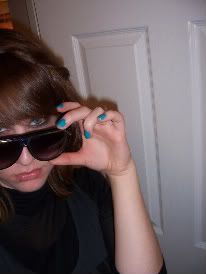I finished Sense and Sensibility last week. It took me way too long- I started it at the beginning of the semester and hardly had time or the energy to read a chapter a night. This one wasn't my favorites, probably because it took so long to get through. There's not much to the story itself- it's heavily driven by dialogue. The characters really drive the book. To me, they are the point of the whole thing and are the only reason I finished it. I felt like I owed it to them to see them through to their somewhat happy ending.
Here's the basics: It's a story about two sisters, slighted by their half brother and his jerk of a wife who inherit of their father's postmortem wealth and promise to take care of the girls (including their mother, and younger sister)... but only sort of. Their lack of wealth drastically dwindles their marrying prospects (of which no one can think of anything else) and launches the reader into Austen's point: which will prevail and land you a man- passion or reason?
Marianne, the younger Miss Dashwood (the middle daughter actually), is the former. She was my girl. She loves the arts and she's kind of got that arm over the forehead, "oh woe is me" thing going on. Elinor Dashwood, the eldest, is the stuffy, responsible one who choses to silently bear the burdens of her family and acquaintances without asking for help and without making a big deal out of anything. As I started the novel, it was Elinor I pitied and almost couldn't stand. I wanted her to feel something or at least admit that she upset or happy or in love dammit! But she didn't. She remained tight lipped and calm through the whole thing.
Let's start with Marianne, the girl after my own heart. She's creative and passionate, always wearing her heart on her dainty little lace-trimmed sleeve. This kind of emotional showboating eventually comes back to bite her in the bonnet. She falls for this guy Willoughby. He's tall, he's got dark hair, stormy eyes and he saves her after she's fallen down a hill and twisted her ankle... in the rain, on his horse. She was hosed from the start. Did I mention he's rich? Or at least will be when his aunt kicks the bucket and he gets her estate. Marianne swoons, she obsesses, she flirts, and she certainly doesn't use discretion. The poor, optimistic thing eventually feels the pain of putting way more into a relationship than you ought to and imagining it's something that it's not. It cuts her deep.
Eventually Willoughby leaves her, jetting off to London with no explanation and no letters in his absence. Marianne writes and writes to him, even going to London herself with the hope of reuniting. There she learns the truth- he's engaged to a woman of higher social standing and wealth than herself. Willoughby then returns her lock of hair and all the despearte, pleading and passionate letters she sent to him over the months. After the jerk marries that rich little git, Marianne really loses it. She cries all the time, hardly eats, and wanders around in the rain so much so she almost dies. She almost DIED because she allowed herself to love someone and feel something so deeply.
Wait a minute. Wait a minute, Jane Austen. Are you saying you're not a fan of this emotional forthcoming thing? You almost killed off a main character because she was too passionate? I thought you and I were soul sisters, but now I'm just... confused.
{Insert pause to reconsider past life choices-especially romantic ones}
Okay, after deep reflection, this is what I've decided. I give you all permission to present me with a Darwin Award if I die over a guy that never loved me in the first place. I was Marianne, once upon a time (and not so very long ago). In fact, I've spent the majority of my "boy crazy" years like her with very little success- okay NO success. You get into Jr High, realize that these creature with the Y chromosome are not so bad, and you want so much to have that slow motion kiss in the rain while "happily ever after" is spelled out in shooting stars behind you. Let's be honest, that just doesn't happen (I'm sorry if you're a tween and I've just prematurely jaded you). I think it took longer for me to realize that than other girls, which could explain my shoddy dating record. Let's chalk it up to my overactive imagination and unrelenting optimism of love. Here's a small, albeit epically embarrassing, sample of the shenanigans I used to pull: concocting ways to trick them into couples skate at America On Wheels, asking them to school dances (over and over and over again), trying to make them jealous at Lakeside with fake boyfriends (actually I was trying to get the enlisted "fake boyfriend" to realize how awesome it would be to actually have me as a girlfriend in real life- double agent style). I won't go on- especially not to more recent escapades, which are less epic and contrived, but still shameful.
It didn't take one epic love affair to get me to change the way I look at dating. It probably took about 19 years of rejection and being passed over for the girls with blue eyes, prettier hair, and less neurotic tendencies. I remember thinking once, probably over a juice box and reading my American Girl Magazine, that I would rather be hurt a million times than not be optimistic about love. You can all groan, it's okay. I am.
I'm sure I'm not the only girl to pull those kinds of shenanigans and make epic declarations about the power of love. Maybe it's a right of passage thing- you have to go crazy before you can be sane. The passionate ones have to learn first hand, the rational ones learn from watching the passionate ones wander around in the rain reciting Shakespeare's Sonnets. I think, after these 19 years of running around crazy, I'm finally ready to be sane, and maybe give Elinor's perspective a chance.
Like I said, Elinor is ruled by sense and regulation. She is the mistress of herself and only shows the emotion she deems necessary for the situation. Even SHE is burned by love when we find out the guy she's in love with, Edward, has been engaged since he was 16 (he basically says he doesn't love the other woman and only proposed because he was bored). He still loves Elinor, though. I think he loves her quiet and peace- the fact that she doesn't run around hollering about her affections for him (ehem, Marianne). He's kind of an awkward guy, so it works for him. And in the end, he comes back to Elinor and they live peacefully ever after, with nothing to worry about but having enough pasture for the cows.
I don't think I'll ever completely be an Elinor (I'm still not sure I'd want to be). And I really don't think that if I start to shut up my emotions and learn to "grin and bear it," Hugh Grant in a cravat will burst into my life and I can finally buy that cow I've had my eye on. It just seems that Jane Austen is advocating for a bit self discretion here- no, self preservation. Maybe she's trying to say that creativity is important, and passion is fun, but a woman's own well being and happiness is important enough to be preserved. I mean, even though Elinor totally gets burned (and yeah, her heart is broken), she doesn't let it consume her, she's able to see the bigger picture to realize that even if Edward doesn't come back, she can still find peace and happiness in other things. And though Marianne will always be a bit of a nutter, after her brush with death she levels out a bit and realizes that the soft spoken and endearingly tragic, Colonel Brandon ain't so band after all. Reason prevails.
So what's my point? I'm afraid it's not going to be an entirely well-rounded one. I'm still crazy. I've still got a run away imagination. And I've definitely had my fair share of Willoughby's (okay, maybe just one). But now I'm armed with the knowledge that I'm the mistress of my own self. I'm able to be quiet and reserved enough to protect the joy and passion and volume with which I live my life.
I am also now obsessed with cravats and ready to read about Mr Darcy's. On to Pride and Prejudice!















